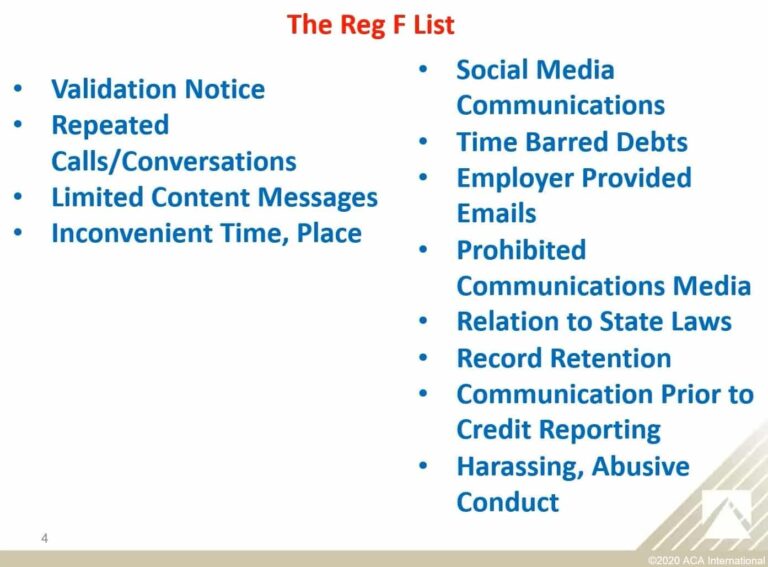How to Train Your Collectors for Reg F

Start Making More Calls Today
Not sure which solution would be the best fit for your needs? We can work with you to find a solution that’s right for your business.
get a free quoteThe myth of Reg F is that once Nov. 30 arrives, anything you might have done to prepare will be set in stone, it’s too late to do anything else, and you’re either ready, or you’re not.
The reality of Reg F is that changes to your systems, policies and training should be ongoing. No matter where you are in your preparation, it’s never too late to start, and it will require constant adaptation – as long as the rule is around.
We sat down with Greg Ruffino, Director of Training at Williams and Fudge, to learn:
- How he has adapted his training procedures to the rule
- Which parts of the rule he is asking his collectors to be aware of, and which parts he is not
- At what point he started his training, and when it will go into effect
- How he is reframing the rule as something positive for his agents and the industry overall
Whether you and your collectors know the rule inside and out, or this is the first time you’re hearing about it, Greg shared strategies for any agency to learn from. Watch our conversation or read more below!
What will be the biggest change to collector's daily routines?
For tenured staff perhaps most especially, the most significant adjustment will be the call restrictions (or the 7-7-7 rule.)
The 7-7-7 rule will be the biggest change that Greg’s team will have to accept, think through and adapt to.
How should you train your collectors to be compliant under Reg F?
Greg explains how looking at the entire picture of Reg F can easily and quickly become overwhelming for collectors.
Although there is a huge amount of effort to prepare for Reg F at the highest level of debt collection organizations – IT, management, operations, etc. – Greg explains how collectors are still on the front lines as the revenue generators.
So what is it that’s most important for them to understand?
Greg shared a visual of what Williams & Fudge is basing their own strategy around.
On the left is what he is training his team on, and what he believes will be most important for day to day staff to be familiar with.
On the right are components of Reg F that he believes will not affect his staff on a day to day basis, or can be handled or automated by management staff.

Greg goes on to explain that even within the confines of the left side of his list, he is still providing ample resources for his collectors to use.
For example, he is not asking his collectors to memorize the Limited Content Message.
Instead, his systems will automatically present the message to them when a button is pushed.
Another example is that the model validation notice will be available for his collectors to pull on any account. This will make information critical to Reg F compliance, like “last statement date,” available for them to share with the consumer if needed.
Focusing on the positives of Reg F
Greg explains that he is training his collectors to shift their mindset about the rule.
First, it might seem like just another regulation in an already heavily regulated industry.
But within the rule, he believes there are many industry wins:
- Sharing more information with the consumer about their debt
- A clear path to dispute so that agencies can react and overcome it immediately
- With the 7-7-7 rule, a clear definition of “abusive or harassing” conduct
- A clear definition of “inconvenient time and place”
Ideally, this rule will increase transparency and reduce litigation for agencies who comply.
How often should you train collectors to prepare?
The key to this question is to know your staff.
Greg explains that the specifics of the rule were not introduced to his team until 15 days before, but each agency will be different.
Ask yourself:
- How much preparation is your staff used to being given?
- What format or cadence of training does your staff prefer?
- How much can your staff absorb at one time?
Greg made a series of five videos for his collectors on the following topics:
- What is Reg F and why does it exist?
- The model validation notice
- Repeated calls/conversations (or the 7-7-7 rule)
- Limited Content Message
- Inconvenient Time/Place
Each video had screenshots and visuals to accompany it. As the videos are shown to his team, Greg is collecting their questions and updating his documents to create a follow-up training.
Conduct training in person (to the best of your ability)
Greg emphasizes that, whatever degree of Reg F you decide to share with collectors, do it over video or in person.
Avoid sharing the information over email or in a document for them to review on their own, especially at first.
Face to face conversations as soon as possible are key.
Where should you start (if you haven't started?)
If Reg F was completely foreign to you before now, Greg offers a few tips:
- Review resources such as ACA Training Zone and AccountsRecovery.net.
- Talk to your vendors about what solutions they can offer you to prepare.
- Decide what is important for your staff to be familiar with, and then talk to them in person (or on camera.)
This is only the beginning!
Greg left us with a call to continue to adapt, even after the deadline of Nov. 30 passes.
Continue to train and adjust into best practices.
Greg also recommends finding your best performing collectors and asking them to share how they overcame Reg F changes.
With the right mindset and the right training, Reg F can be a positive shift for the industry and the future of debt collection.
*This information does not, and is not intended to, constitute legal advice; instead, all information is for general informational purposes only.
About The Author
Alex Villafranca
Alex is the CEO, co-founder and Head of Revenue at Arbeit, a better outbound communication software that makes businesses more profitable.